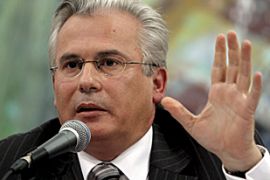Spanish judge Garzon suspended
Baltasar Garzon suspended from his post ahead of trial for overreaching his authority.

‘Sad day’
On Wednesday, the supreme court removed the last obstacle to Garzon’s trial over the case, although no date has been set.
If convicted he would avoid prison but could be suspended for up to 20 years, which would effectively end the career of the 54-year-old.
Garzon has argued that the disappearances constituted crimes against humanity and were therefore not covered by the amnesty.
Human Rights Watch condemned the CGPJ’s decision to suspend Garzon who is famous for going after international figures like Osama Bin Laden and Augusto Pinochet, the former Chilean dictator.
“This is a sad day for the cause of human rights. Garzon was instrumental in delivering justice for victims of atrocities abroad and now he is being punished for trying to do the same at home,” Reed Brody, the rights group’s legal counsel, said in a statement.
“Garzon’s decision not to apply Spain’s amnesty, for which he is being prosecuted, is supported by international law, which impose on states a duty to investigate the worst international crimes, including crimes against humanity.
“Thanks to Garzon, Spain became a symbol of justice for atrocity victims around the world. Now justice itself has become the victim in Spain.”
ICC offer
On Tuesday, Garzon asked Spanish authorities to be allowed to work as a consultant for the International Criminal Court (ICC), following an offer from The Hague-based tribunal.
The ICC posting, scheduled to last seven months, had been seen as an attempt by Garzon to avoid the humiliation of a formal suspension over the charges against him.
The judge is also involved in two other cases, one regarding wiretaps he ordered as part of a probe into a corruption scandal involving members of the main opposition party, and another over suspected bribery over payments he allegedly received for seminars in New York.
He first made world headlines in October 1998 when he ordered the arrest of Pinochet in London under the principle of “universal jurisdiction”.
Universal jurisdiction holds that heinous crimes like torture or terrorism can be tried in Spain even if they had no link to the country.
Garzon also indicted Bin Laden in 2003 over the September 11, 2001 attacks in the United States and looked into the deaths of Spaniards in Argentina during the military regime of 1976 to 1983.
But critics like to point out that both his high-profile cases against Pinochet and Bin Laden went nowhere.
Conservative politicians and media in Spain have accused him of opening old wounds with some of his probes.
Garzon has also been active in Spain’s crackdown on the Basque separatist group Eta and is reported to be on the organisation’s list of assassination targets.